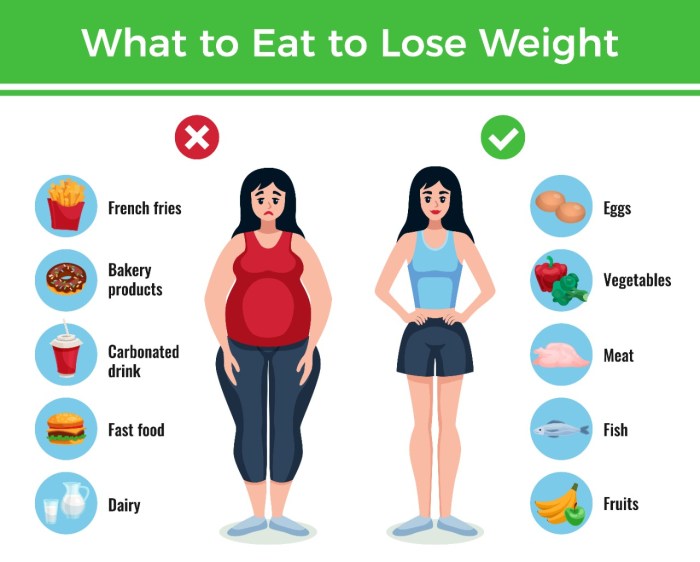
Addressing Psychological Factors

Weight loss is not solely a physical journey; it’s significantly influenced by psychological factors. Understanding and addressing these factors is crucial for achieving sustainable weight management and overall well-being. Ignoring the mental and emotional aspects can lead to setbacks and hinder long-term success.Stress and weight gain are closely intertwined. When we experience stress, our bodies release cortisol, a hormone that can increase appetite and promote fat storage, particularly around the abdomen.
Chronic stress, therefore, can lead to significant weight gain over time. Furthermore, stress often leads to unhealthy coping mechanisms, such as emotional eating, which further exacerbates the problem. Managing stress effectively is therefore a vital component of any successful weight loss plan.
The Relationship Between Stress and Weight Gain
Cortisol, the primary stress hormone, plays a pivotal role in this connection. Elevated cortisol levels stimulate the appetite and can lead to cravings for high-calorie, comfort foods. These foods often provide temporary relief from stress but contribute to long-term weight gain. Furthermore, chronic stress disrupts sleep patterns, which further impacts hormonal balance and can increase appetite and cravings.
Studies have shown a strong correlation between high stress levels and increased body mass index (BMI). For example, individuals experiencing significant life changes, such as job loss or relationship difficulties, often exhibit increased weight gain due to the associated stress and its impact on eating habits and activity levels.
Common Emotional Eating Triggers and Coping Mechanisms
Emotional eating involves using food to cope with negative emotions like stress, sadness, boredom, or anxiety. Common triggers include loneliness, feelings of inadequacy, and stressful life events. Unhealthy coping mechanisms, such as overeating or consuming comfort foods high in sugar and fat, provide temporary relief but ultimately worsen the problem. These habits can become ingrained and difficult to break without conscious effort and the development of healthier coping strategies.
For instance, instead of reaching for a bag of chips when feeling stressed, one might engage in a relaxing activity like yoga or meditation.
Strategies for Developing a Positive Mindset and Maintaining Motivation
Developing a positive mindset is essential for long-term weight loss success. This involves setting realistic goals, celebrating small victories, and practicing self-compassion. Focusing on progress rather than perfection helps maintain motivation. Regular self-reflection and positive self-talk can help overcome setbacks and stay committed to the weight loss journey. For example, instead of dwelling on a missed workout, one might focus on the next opportunity to exercise and reaffirm their commitment to their health goals.
Visualizing success and rewarding oneself for milestones, such as reaching a specific weight loss target or consistently sticking to a healthy eating plan, can significantly enhance motivation and adherence to the plan.
A Self-Care Plan Incorporating Stress Management Techniques and Emotional Regulation Strategies
A comprehensive self-care plan should include regular physical activity, mindful eating practices, sufficient sleep, and stress-reduction techniques. Stress management techniques could include yoga, meditation, deep breathing exercises, or spending time in nature. Emotional regulation strategies involve identifying and addressing emotional triggers, developing healthier coping mechanisms, and seeking support when needed. This might involve journaling, talking to a therapist, or engaging in hobbies that promote relaxation and well-being.
A sample weekly plan could include 30 minutes of exercise most days, 10 minutes of daily meditation, and scheduling time for relaxing activities like reading or spending time with loved ones. Prioritizing sleep and ensuring adequate rest is also crucial for managing stress and maintaining overall well-being. The plan should be tailored to individual needs and preferences to ensure adherence and long-term success.





